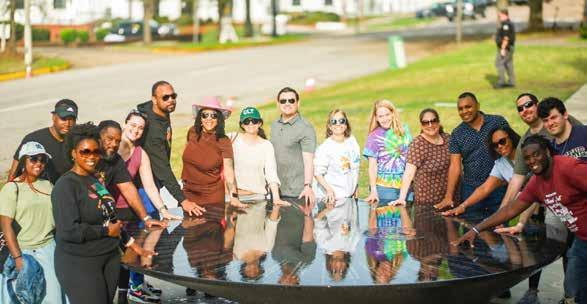
5 minute read
Charlotte Black/Jewish Alliance Grows and Expands
May 2024
By Mary Eshet
The Charlotte Black/Jewish Alliance (BJA) is embarking on an expansion plan designed to broaden its membership and position it for increased impact. The BJA is co-sponsored by Johnson C. Smith University and the Stan Greenspon Holocaust and Social Justice Education Center at Queens University of Charlotte. The first cohort of five Black and five Jewish young leaders came together in 2021, against the backdrop of George Floyd’s murder and a rapid rise in antisemitism. The vision is to immerse participants in each other’s differences and create a safe space for conversation.
Each cohort begins its yearlong experience with a Charlotte tour exploring Black and Jewish history in Charlotte. They continue with monthly educational meetings. A high point of the program is traveling to Atlanta, Birmingham, Montgomery, and Selma to learn about Black and Jewish history in the South, and to continue building relationships.
The third cohort completed their Deep South journey in March. As with previous cohorts, it was a crescendo moment in the program when participants explored each other’s legacies, engaged in deep conversations, and bonded as they shared intense experiences and traveled together by bus for four days.
The program is staffed by three faculty: Melvin Herring and Cindy Kistenberg, both professors at JCSU, and Rabbi Judy Schindler, director of the Greenspon Center. All three joined the trip south. “One highlight of the trip that accel erated the cohesion of the group was the racial healing circle on the first night,” said Herring. “It is a facilitated, secure, authentic discussion, starting in groups of two. The focus is not on chang ing, but on receiving.”
Andy Harkavy, a member of the newest cohort, said the ra cial healing circle was poignant. “We learned that the shortest distance between two people is a story. We have such different stories, but we have so much more in common. We can’t for get how to talk, listen, and learn from each other.”
T’helah Ben-Dan, another member of the third cohort, said “The Legacy Museum and the Lynching Memorial in Birmingham were deeply impactful, both serving as ur gent reminders of the need to dismantle white supremacy, which we know is the root of both racism and antisemitism.”
Both Harkavy and Ben-Dan envision the program will have an impact beyond their group and the twelve-month term. “I envision us turning our discussions into action, taking tangible steps to combat antisemitism and racism, but also to celebrate and support Jewish and Black community members and initiatives here in Charlotte,” said Ben-Dan.
The BJA is working to increase its effect by opening membership to a larger group. The cohorts, comprised of young Black and Jewish leaders aged 25–40, will now be labeled as “leadership cohorts,” and the overall Charlotte Black/Jewish Alliance will be open to all who want to join. “We have had people outside that age range ask how they can get involved,” said Schindler. “While we plan to continue the monthly programming and Deep South Pilgrimage for the leadership track, we are very excited about welcoming others to the group and expanding relevant programming for the broader community.”
One program the BJA has helped expand is Soul Food Shabbat. For years, Queens students have sponsored a Soul Food Shabbat bringing together the Queens Black Student Union and Queens Hillel for a celebration of Shabbat and an exploration of commonalities and past and present struggles. Dinner is served with traditional Jewish and African American foods such as challah, collard greens, cornbread, fried chicken, kugel, and rugelach.
Prior to the 2024 Soul Food Shabbat, the BJA, Greenspon Center, and JCSU hosted a screening of “Shared Legacies: The African American-Jewish Civil Rights Alliance.” The film shares the often-forgotten story of the coalition and friendship between the Jewish and African-American communities during the Civil Rights Movement. The program was followed by conversations with BJA leaders, and discussions continued at Soul Food Shabbat.
“Soul Food Shabbat is such a wonderful experience for me, our campus community, and Charlotte,” said Darryl White, Queens assistant dean of Diversity, Inclusion, & Community Engagement. “The chance for us to come together over our cultural foods to break down barriers while celebrating our differences and our commonalities is a great model for our society to embrace. Every year that we have the Soul Food Shabbat, I learn so much more about Black and Jewish relations.”
Plans for broader membership are being led by Terrell Hamlet, Rachael Coe, and Tyran Green who have all participated in leadership cohorts. “We are talking about community events, volunteer efforts, and opportunities for connection. It’s a new branch on our family tree,” said Coe.
“We are looking for people who want to make a difference and bring new perspectives as we seek to put aside -isms and schisms for a united front,” said Hamlet.
Kistenberg, who has been with the BJA since its inception, is enthusiastic about the next chapter. “I love that we are opening up to people outside the ages of the cohorts,” she said. “If we can bring communities together in a variety of ways, the better chance we have of creating change. People are so polarized, and we need to open dialogues. We have to have space for conversations, and not run from tough issues.”
If you are interested in participating in the Charlotte Black/ Jewish Alliance, contact Judy Schindler at schindlerj@queens.edu.











